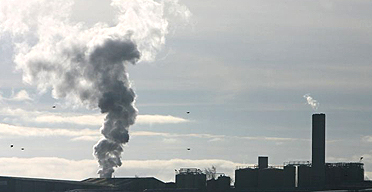
The government, farmers and supermarkets were crossing their fingers last night that the H5N1 outbreak on Bernard Matthews's turkey farm in Suffolk was an isolated case and the lethal disease had not spread further.
As the 200 cullers gassed the last of 159,000 turkeys at the farm and no new suspicious deaths or illnesses were reported, the environment secretary, David Miliband, told the Commons that the government had reacted swiftly and efficiently, but still did not know how the infection had arrived.
He ruled out claims that it could have been caused by chicks imported from Hungary. "In respect of the chicks, they all came from within this country, so there is no Hungarian connection. The fact is the factory involved in the Hungarian outbreak is not a Bernard Matthews factory.
"We have not dismissed any suggestions. We are pursuing all possible avenues of inquiry. It remains the case that the most likely reason or route of this problem does lie in a link with the wild bird population, but that does not mean we should not pursue any other avenues in a serious way with full speed, and that is what we are doing."
EU health officials and MEPs said yesterday the similarities of the outbreak with recent cases in Hungary indicated a link. One official who has been in close contact with the UK authorities confirmed that the H5N1 strain found in East Anglia was "virtually identical" to two separate recent outbreaks among geese in Hungary. He said that in both Hungarian outbreaks this year there had been no evidence suggesting that the farmed birds were infected by wild birds.
A spokesman for Bernard Matthews last night said there was no link between the company's operations in Hungary and Britain. Asked if all the eggs at his hatchery were British, the spokesman said: "All the birds were British and no eggs have been transported from Hungary."
Caroline Lucas, the Green party MEP, called for government research into the links between large poultry companies and the spread of avian flu around the world. "The government is ignoring a massive amount of evidence that its spread is linked to farming practices, not wild birds," she said. "These chicken houses are themselves viral factory farms - they are creating the virus there."
The RSPB also strongly denied reports that H5N1 was now endemic in British wild birds, and questioned government statements that wild birds were responsible for the outbreak. "They are one of the options, but this outbreak does not fit with the international movements of birds at this time. Thousands of live birds have been tested in the last year as part of government research into avian flu, but none have been found to have the disease."
Adriano Guedes, consultant for the GMB Migrant Worker's Project in Suffolk, said the 60 Portuguese workers employed to catch the turkeys since the outbreak were being paid £18 an hour and were working 12 hour shifts. "Some are concerned about illness, but they've been told the danger is minimal. On Saturday they were offered 200% pay - 300% at the weekend - and some extra days off to help catch the birds. They're provided with protective clothing and given a pill to take each day."
Heather Peck, regional operations director leading the state veterinary service's investigation, said it could be days before her officers arrive at a "most likely" explanation of how the virus penetrated the steel sheds. "It's a forensic examination. We're following up every possible movement. We already know the birds arrived before the disease, because of the incubation period. So the flock caught the disease on the farm. They were brought on to the farm as one-day-old chicks. Those birds are now four weeks old."
It emerged last night that a 17-year-old girl has died from bird flu in Egypt, apparently after coming into contact with sick and dead birds and falling ill in January. The disease has now killed 166 people worldwide in the past four years.
Export bans
· Russia, Macedonia, Japan, South Korea, South Africa, Hong Kong and Jersey have banned British poultry imports, and other countries have imposed restrictions on their flocks to try to minimise the risk of the H5N1 infection spreading. The Netherlands and Norway ordered all poultry to be taken indoors or to be secured. Ireland banned some imports and France ordered an investigation of the risks.
· UK supermarkets reported only a slight dip in poultry sales after the outbreak. Tesco said it had seen a "single digit" percentage drop across its fresh and frozen poultry products. "There hasn't been a huge effect, but yes, there is an inevitable dip," a spokeswoman said. But Waitrose and Marks & Spencer said news of the disease had had no impact on sales. "To date there has been no impact on poultry sales. Our customers understand this is not a food safety issue," said a Waitrose spokesman.

